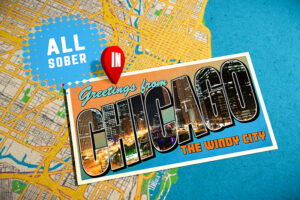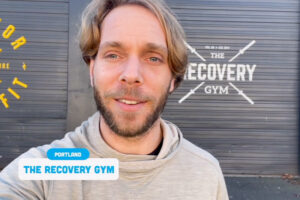Sweet, Sour, Savory, Sober: How To Eat Right and Feel Good
Cutting out alcohol gives you an edge in getting fit and looking fine. Follow a few tips on nutrition to make the most of it

It probably doesn’t get said enough: Sobriety is good for you. It can improve your eating and sleeping habits, give you more energy, boost your mood and, if it’s a goal of yours, eliminate calories from your diet.
That’s true whether you’re dipping a toe in sober life for Dry January, thinking about going sober for longer, or embarking on recovery from addiction. And if you’re making the effort to go sober, you might as well reap the benefits. Pair it with some intentional steps to improve your overall nutrition, and you’ll be golden. Eating well, as you’ll find, can profoundly impact your sense of well-being.
Plus, if you want to take your body to the next level and get fit this year, good nutrition is the starting line and food is your fuel.
Real Quick: What Is Good Nutrition?
Good nutrition is integral to a healthy lifestyle — in or out of recovery. At the most basic level, it means eating foods from all food groups in the right amounts. It also means choosing foods with less saturated fat, salt and sugar.
Many different nutrients are essential for good health. You’ve got your proteins, carbohydrates, fats, vitamins, minerals and water (yes, water is a nutrient).
Proteins are needed for the growth and repair of tissues. Carbohydrates provide energy for the body. Fats are necessary for various functions, including the absorption of some vitamins. Vitamins and minerals are needed for all kinds of critical things your body does. Water is essential for proper hydration and circulation.
A healthy diet means variety, but also mindful selectiveness. Enjoy foods from the entire food pyramid, but not too much or too little of anything. To take one example, overeating fat can lead to obesity and heart disease, while eating too little can lead to malnutrition.
Why Eat Healthy (in Recovery or Not)?
A well-rounded diet is recommended for anyone, but it’s essential if you’re in recovery from a substance use disorder (SUD). Eating nutritious foods helps restore the body’s natural balance and can help you out with mood and energy issues. Adequate nutrition, after all, is necessary for the proper functioning of all organs and systems, including the brain.
If you’re coming back from addiction, that’s crucial because substance use disorders can cause extensive damage to the brain and body over time. Eating well decreases stress and anxiety, two common triggers for relapse (and just bad vibes in general, whether you’re in recovery or not). A healthy diet can also give you the priceless gift of quality sleep, as the nutrients you eat help support your body’s natural sleep-wake cycle.
Did You Say ‘Quality Sleep’?
Getting sufficient sleep each night is vital for overall health and well-being, which is a very solid goal for sobriety — and the foundation of recovery. A good night’s sleep can improve mood, cognitive function and physical health.
Most people know that nutrition is essential for overall health, but many don’t realize that it can also impact sleep. The right foods can help you fall asleep more quickly and stay asleep longer, while the wrong foods can have the opposite effect.
For example, eating a large meal before bed can make it harder to fall asleep, as your body will be working to digest the food. But a light snack of tryptophan-rich foods like yogurt or nuts can help you drift off to sleep faster. Caffeine before bed, of course, is a no-no; it can disrupt sleep patterns.
But the connection between good nutrition and righteous sleep goes beyond that. You know a poor diet can lead to health problems, but studies have shown that poor sleep can as well; it’s been linked to obesity, type 2 diabetes and cardiovascular disease. By making some simple changes to your diet — read on! — you can enjoy a good night’s sleep and all the benefits that come with it.
Believe it: Eating a healthy diet is one of the best things you can do to ensure a good night’s rest. If you’re in recovery, focus on improving nutrition to give yourself the best possible chance for long-term sobriety.
How Substance Use Affects Nutrition
Substance use, especially at a severe level, can have a big impact on your eating habits. Using alcohol and drugs can lead to less-than-ideal nutrition. Significant substance use can create poor dietary habits and damage the body’s ability to absorb and process nutrients.
Substance use can also increase caloric intake and cause weight gain. For others, it can lead to decreased appetite and unhealthy weight loss.
There are worse scenarios that we’d be remiss not to mention. Chronic substance use can cause nutrient deficiencies and other health problems such as liver disease and pancreatitis.
So: How To Eat Well
A balanced diet is vital for everyone, and it’s pretty key to healing your body in recovery. Some tips on how to start eating well:
- Get enough protein. Protein is essential for brain growth and repair, so it should be a component of every meal. Good protein sources include lean meats, poultry, fish, eggs, dairy and beans.
- Include complex carbohydrates in every meal. Complex carbs are slow-burning and provide sustained energy throughout the day — a benefit of sobriety you should maximize! Good sources include whole grains, starchy vegetables and legumes.
- Incorporate healthy fats into your diet. Not all fats are bad for you, and healthy fats are essential for many bodily functions. Find them in avocados, nuts, seeds, olive oil and fish oil.
- Stay hydrated. By drinking plenty of fluids throughout the day, you can ensure your organs and systems are getting enough blood flow. Water is the best option, but low-sugar sports drinks can also help with electrolyte balance.
Following a few simple meal-planning guidelines can make nutrition one of your most powerful tools in sobriety.
And, hey, you were already looking to try out some new recipes and dining-out spots during your sober sojourn, right?
More Lifestyle
The Definitive Guide to Sober Travel
Vacations shouldn't be nerve-racking, but in recovery, it's not always that simple. We asked three sober travel pros how to make your trips fun — and more fulfilling than ever.
Sure-Bet Sober Date Ideas
Ready to get back out there? Sober dating isn't so hard. But here are a few pointers anyway, to help you find your groove.
Sobriety Roundtable: What's Your Favorite Sober Activity?
From roller derby to CrossFit and dog fostering to splurging on Mexican, nine sober folks shared what they do for fun and fulfillment. Get some ideas for your own Dry January or longer-term sobriety!
The Joy of Baking (Sober)
Two months sober, Annie Zimmerman decided to make cookies. Now, her hobby turned passion yields fulfillment, connection and delicious soberversary cakes. Read the interview!
Now Elite NFL Players, They First Tackled Addiction | News Roundup
All Sober compiles the best of the latest headlines. Here's your addiction and recovery news for the week of Feb. 19, 2024!
All Sober in Chicago
A great town for recovery, come sun, rain or snow! Check out our video guide to the Windy City's best sober options for bars, bottle shops — and even an arcade with vintage games.
All Sober in New York
The Big Apple truly has it all — including a sober bar with a "witchy vibe" and an array of enchanting non-alc cocktails. Take a peek in our video guide to the sober city!
All Sober in Portland
Oregon's cultural capital may be weird and proud, but it's sober and proud too! We scoped out the coolest sober-friendly spots in our new video guide.










